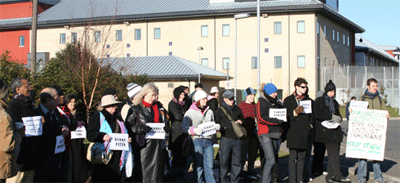Author:Oonagh Skrine
How the UK fails to protect those fleeing violence and persecution
The UK would like to pride itself as being a bastion of human rights. Its treatment of those who arrive seeking a haven from persecution, however, tells a different story. In the Government's effort to appear tough on immigration, those who most need protection become the victims. On Monday 12 February a plane set off from RAF Brize Norton taking asylum seekers back to face the violence of Iraq. No civilian plane would undertake the journey to Northern Iraq, despite the fact that the Home Office deems it safe enough to forcibly return asylum seekers. For most of us the war in Iraq remains safely inside the TV and newspapers - even the plane setting off from RAF Brize Norton seems distant and unconnected. The story of two men on board, however, starts much closer to home. Ahmed and Adnan had been building lives in Bristol since fleeing Kurdistan seven years ago. For the last four years they have been in the process of appealing against the refusal of their asylum claims, meaning that they were obliged to sign on at Trinity Road police station at regular intervals. The last time they went to sign on, suspecting nothing out of the ordinary, they were detained in the cells for five days before being sent to detention centres at Campsfield and Oakington to await the plane back to Iraq. Amnesty International has expressed 'serious concern' about returns to Iraq, as 'forcing people back to Iraq, even to the North, will put people's lives at risk', the UN has said all repatriations to Iraq should be on a voluntary basis and the Kurdistan regional government also objects to the UK forcibly returning asylum seekers. Added to this is the fact that both Ahmed and Adnan fled Kurdistan because of their opposition to the Patriotic Union of Kurdistan, currently in authority there. The danger they are returning to is clear. With strong encouragement from Bristolians and students (30 people turned out to protest on a freezing Friday evening), Stephen Williams agreed to make representations to the Home Office on behalf of Ahmed and Adnan. He was, however, stalled and denied information right up to the plane's departure. It would be comforting to think that the government's treatment of Ahmed and Adnan was somehow exceptional. Unfortunately this is not the case. Iraq is not the first war-torn country to be deemed safe by the Home Office - earlier this month Abdullah Toki was murdered in Afghanistan after being deported to 'safety'. The regular signing on under constant threat of deportation, the detention centres and forced deportation are all parts of an asylum system known to drive people to suicide and self harm. The hoops through those wishing to find a safe haven in this country must jump start earlier: reporting to Croydon within forty eight hours of arrival in the country, filling in a lengthy statement of evidence in English within a month... in all probability to little avail since only 10% of asylum seekers are accepted without appeal; after appeals the figure goes up to 20%. Ahmed and Adnan's brief periods in detention centres prior to deportation reflect the fate of many of those who fail to submit their applications in time or come from a country perceived as 'safe'. Over 2600 people, mainly asylum seekers, some children, are detained without trial, time limit or automatic rights to bail. At a time when prisons are overstretched the government is extending its capacity to detain immigrants who have committed no crime to 4000. The riots in Harmondsworth detention centre last November brought the issue to wider public attention as detainees spelled 'help...SOS...freedom' in the courtyard. There is little report of improvement from the bullying by staff, strip searches and solitary confinement which provoked the riot. No other European country uses detention so extensively. Given the constant insecurity, fear of deportation and denial of liberty, it is perhaps unsurprising that 17 people have committed suicide in detention centres in the past five years. The process of deportation is equally barbaric. The first plane to deport people to Iraq was last September - the asylum seekers were put onto a coach handcuffed and barefoot before being transferred to the military plane and (comfortingly) given flak jackets to wear. To ensure that the specially chartered planes are full, extra deportees are rounded up and detained, contributing to the fear and insecurity. Although it is too late for Ahmed and Adnan, already deported to Kurdistan, the injustices of the asylum system in the UK continue to victimise the most vulnerable. No one expects to be locked up without charge or trial in the very country they came to seeking refuge from persecution. |


